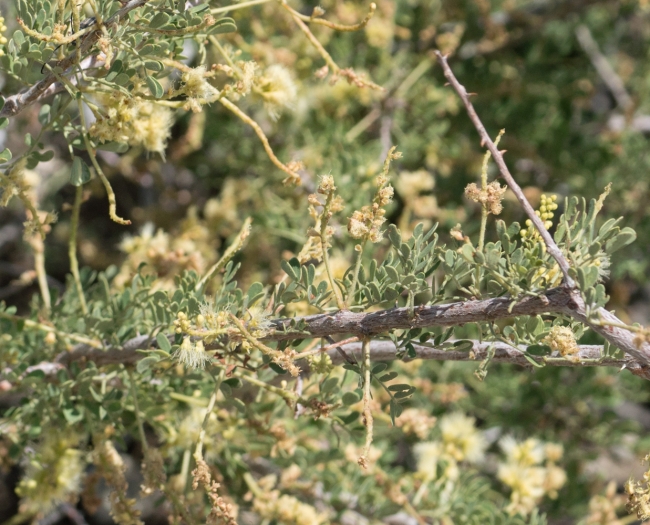Catclaw Acacia
(Senegalia greggii)
Catclaw Acacia (Senegalia greggii)
/
/

Jesse Rorabaugh
Public Domain
Image By:
Jesse Rorabaugh
Recorded By:
Copyright:
Public Domain
Copyright Notice:
Photo by: Jesse Rorabaugh | License Type: Public Domain | License URL: http://creativecommons.org/publicdomain/zero/1.0/ | Rights Holder: Jesse Rorabaugh | Publisher: iNaturalist | Date Created: 2016-05-07T13:08:19-07:00 |




















































Estimated Native Range
Summary
Senegalia greggii, commonly known as Catclaw Acacia, is a deciduous tree or large shrub native to arid desert regions and desert scrublands in the Southwestern United States, California, and northern Mexico. It typically grows to 10–15 m (33–49 ft) tall with a trunk up to 20–30 cm (7.9–11.8 in) in diameter. The plant’s form is irregular, often with a twisted trunk and branches that bear curved, claw-like thorns, hence the common name. The flowers are small, with five cream-colored petals and numerous creamy yellow stamens, forming dense cylindrical spikes that are quite showy when in bloom. Flowering occurs in late spring to early summer.
Catclaw Acacia is valued for its adaptability to extreme drought, making it an excellent choice for xeriscaping and desert gardens. Its ability to thrive with minimal water once established is a significant benefit in arid climates. The plant provides habitat and food for wildlife, including nectar for bees. It is used for erosion control and can be planted as a barrier due to its thorny branches. In cultivation, it requires full sun and can tolerate a range of soil types, provided they have good drainage. While it is drought-tolerant, occasional deep watering during prolonged dry periods can benefit the plant. It is important to note that the thorns can be a hazard, and it should be sited away from pedestrian traffic.CC BY-SA 4.0
Catclaw Acacia is valued for its adaptability to extreme drought, making it an excellent choice for xeriscaping and desert gardens. Its ability to thrive with minimal water once established is a significant benefit in arid climates. The plant provides habitat and food for wildlife, including nectar for bees. It is used for erosion control and can be planted as a barrier due to its thorny branches. In cultivation, it requires full sun and can tolerate a range of soil types, provided they have good drainage. While it is drought-tolerant, occasional deep watering during prolonged dry periods can benefit the plant. It is important to note that the thorns can be a hazard, and it should be sited away from pedestrian traffic.CC BY-SA 4.0
Plant Description
- Plant Type: Tree, Shrub
- Height: 16-25 feet
- Width: 15-20 feet
- Growth Rate: Slow
- Flower Color: Yellow
- Flowering Season: Spring
- Leaf Retention: Deciduous
Growth Requirements
- Sun: Full Sun
- Water: Low, Very Low
- Drainage: Fast, Medium, Slow
Common Uses
Bee Garden, Butterfly Garden, Fire Resistant, Low Maintenance, Showy Flowers
Natural Habitat
native to arid desert regions and desert scrublands in the Southwestern United States, California, and northern Mexico
Other Names
Common Names: Texas-Mimosa, Cat’s-Claw, Devil’s-Claw Acacia, Paradise Flower, Wait-A-Minute Bush, Wait-A-Bit Tree, Catclaw Mesquite
Scientific Names: , Senegalia greggii, Acacia greggii, Acacia greggii var. arizonica, Acacia greggii var. greggii, Acacia rotundata, Acacia durandiana, Acacia greggii var. arizonicas, Mimosa rotundata,
GBIF Accepted Name: Senegalia greggii (A.Gray) Britton & Rose